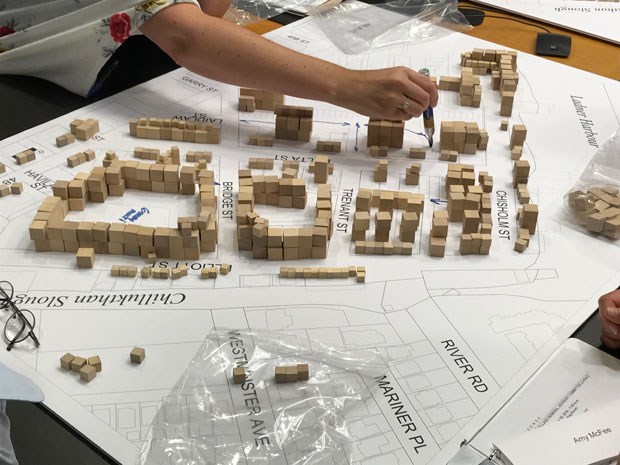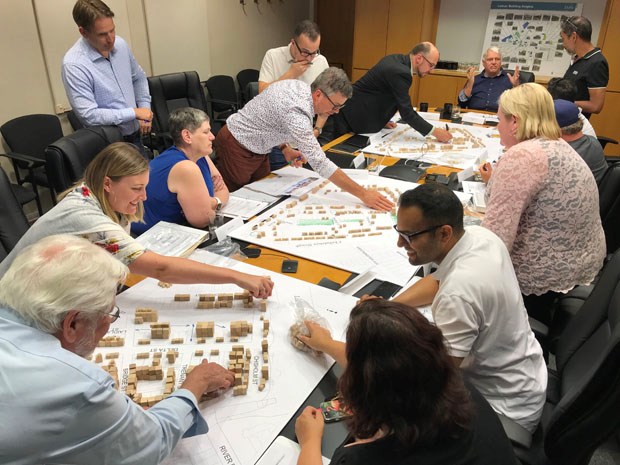If the City of Delta wants Ladner Village renewed, it must get out of the way.
That was the message three local architects conveyed to the Ladner Village renewal advisory committee last week.
Brian Hart with Brain G. Hart & Company, Joe Muego with Hearth Architectural Inc. and Wesley Wollin with Buro 47 Architecture talked to the committee about opportunities and challenges facing a revitalization of the village and waterfront. All three have been involved with projects in the area.
One of the themes that came from the discussion last Thursday was a frank assessment of city’s policies, which the architects argued don’t coincide with what’s economically feasible to encourage redevelopment.

Just one example is a redevelopment Wollin has been involved with of the former barber shop building in the 4800-block of Delta Street. It’s been over two years since Delta council gave conditional approval to a rezoning application for a two-and-a-half-storey mixed use building, but the project has had a difficult time finding an investor.
Following the meeting, Hart told the Optimist it’s clear a taller building with more residential is needed to make it worthwhile, but the city’s current zoning and community plan won’t allow it.
“You have policies, you have OCPs, you have zoning regulations, all of that stuff which doesn’t leave enough space for a developer to figure out what he needs to do. So get out of the way and just tell us what you want your town to look like and give us, the development industry, a chance to show you how to build it,” said Hart.
Muego agreed, saying a performance-based approach, rather than prospective zoning, is needed.
“If you want someone to solve a problem, make them put their money where their mouth is and they’ll risk it. They’ll risk if they think it’s going to work. You can have hopes and dreams but no one is going to do it if it doesn’t make sense financially,” said Muego.
Hart noted there’s always a balance, as well as resident pushback, that needs to be weighed, but more density is also needed to bring in additional residents to support local businesses.
“The problem is the language of the people writing the plan. There’s setback, height and floor-space ratio. That’s the only language they know. None of those are qualitative measures which are what it looks like, what it feels like, how it relates to the street, what does it achieve. If you’ve got big goals for the town, how does this move the town toward those goals? It’s a real simple question and it makes the developer think as well. It also gives you better quality developers because those are the ones prepared to think that out,” added Hart.
Muego noted what will be needed in order for that to happen is political will from the city’s elected officials.
During their discussion with the committee, Wollin said there’s no “hook” to encourage people to visit the village, and that more incentives are needed. Otherwise, redevelopment will be very slow and on a patchwork basis.
He also suggested, among other things, creating gathering places and public art.
Noting much of the village “is bulldozer fodder” built after the Second World War, Hart was asked about what should happen with the single-storey building that houses the Delta Hospital Auxiliary thrift store which dominates Delta Street. He suggested that, hopefully, the auxiliary will be encouraged to redevelop with perhaps several levels of seniors or assisted living housing above.
As far as the former Ladner Village Hardware building on Delta Street, which will remain the same for now, expect that it will be renovated and split into three smaller stores. Hart noted he sees that coming down within the next decade if a development proposal that makes sense is approved.
Saying there’s more economic sense for six-storey buildings, Hart said redevelopment of the waterfront is extremely important, noting 30-year leases are enough already to get something going with the vacant city-owned Seven Seas property.
Coun. Bruce McDonald, the committee chair, said it would be important “to make sure council is not going to blink” if faced with opposition to allow greater density and heights on Chisholm Street.



